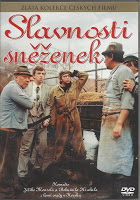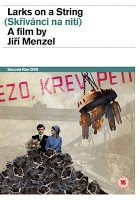
Available to watch

On Amazon Prime I stumbled across a couple of films based on Bohumil Hrabal’s writings that are available for free to Prime members. First was The Snowdrop Festival, directed by Jiří Menzel. As I mentioned in the post, it’s a quirky, fun movie with a strong undertow of poignancy. Menzel doesn’t capture the full complexity of Hrabal’s writings, opting for a lighthearted capriciousness, but he gets the banality and quirkiness of these residents’ lives. I enjoyed watching it a second time.
From my original post,
“Even though the movie provides many laughs and smiles, a sadness permeates the bucolic setting. Like the stories, alcohol provides a social lubricant as well as an escape. Just what people are trying to escape isn’t quite clear, amplifying Hrabal’s ambiguous messages, although you wouldn’t be far off the mark if you simply answered “their lives.” While some things give these characters joy, many things drive their desire to escape, including family, work, government, opportunity, and materialism.”

Larks on a String, another Menzel film adaptation of Hrabal’s stories. The movie came out in 1969, so the lack of delicacy around political issues feels even more pronounced today. From my original post:
“The screenplay of Larks on a String is based on a book of short stories. All the stories have the same location but different characters. What was important was to make a coherent screenplay based on all those different characters. Hrabal used to say, ‘We have to plait it all into one braid.’” When we were looking for a way to link the separate storylines, how to unite these various characters, I remembered an old political joke from the ‘50s: The workers are ordered to attend a meeting where a comrade gives a lecture explaining, ‘In the present, we have socialism, but in the future we will have communism.’ After the lecture, he asks the workers if they have any questions. One of the workers raises his hand and says, ‘It’s good that we have socialism and will soon have communism, but where is the bread, where is the milk, where is the butter?’ The comrade answers, ‘This is a rather complicated question. Ask me again at the next lecture.’ A week later, the workers are ordered to attend another meeting, and the same thing happens—the comrade extols the virtues of socialism and communism, and afterwards asks if anyone has any questions. Another worker raises his hand and says, ‘It’s good we have socialism and will soon have communism, but where is the bread, where is the milk, where is the butter, and where is the worker who asked about this last time?’ So this old political joke gave us the key to the whole structure of the screenplay.”
There’s a political feel that is a little too close to today’s cancel culture for not toeing the party line:
“You wanted to see where the production of steel starts. This is the place, the scrap heap. All that you can see here will be smelted down into high-grade steel. We’ll make tractors out of this steel to plough our fields. We’ll make more washing machines so you can wash your dirty overalls. [Looking at an idling worker] These are our voluntary workers. Mostly of bourgeois origin. We’ll also smelt them down into a new kind of people.”
There are several more Czech movies available to watch for no additional fees on Amazon Prime, such as Lemonade Joe, The Good Plumber, and My Sweet Little Village, among others. I don’t know how long these movies will be free on Prime so watch them soon if you’re interested.
And now for something different, but free online until July 1…
Folger Theatre’s Macbeth. From Terry Teachout’s review at The Wall Street Journal (no link since it’s behind a paywall):
While I’d hesitate to say which of those 13 “Macbeths” I liked best, the one of which I have the most indelibly specific memories is the version co-directed by Aaron Posner and Teller (Penn’s silent partner) in 2008 for New Jersey’s Two River Theater Company and the Folger Theatre in Washington. Fortunately, a live performance from the Washington run was recorded and is now streaming on the Folger’s website. Viewing it has confirmed all my impressions of the show, which I saw twice, once in each city, the second time purely for my pleasure. It is a “Macbeth” of explosive dynamism, a high-speed production running for just over two hours (the text has been extensively but discreetly trimmed) that is both flamboyant and essentially serious. The directors call it “a supernatural horror thriller,” which is true enough but a bit misleading. Stage magic, stage violence, stage blood: All are here in copious quantities, yet all illuminate, rather than obscure, the play’s timeless truths about humankind’s flawed nature.
The above link has both parts of the performance as well as several special features. I’ll embed one of the special feature videos once YouTube gives me the link.
Jean
Oooh! I'll look them up tomorrow! Thanks!